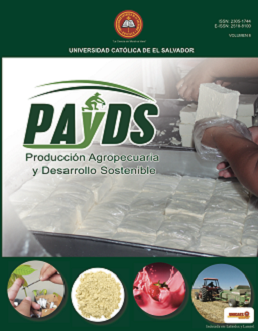Sensory evaluation and analysis in the reduction of sugar percentage in milks flavored popular consumption, by reformulating them
DOI:
https://doi.org/10.5377/payds.v8i0.8709Keywords:
Stabilizer, pasteurization, ingestion, sweeteners, flavors, sweet wheyAbstract
Flavored milk is one of most consumed dairy products in El Salvador; however, due to its high sugar content, it is a harmful food for the consumer. In view of this, an alternative and production of flavored milk with low sugar content was developed. Three flavored milk formulas (chocolate, strawberry, and caramel) were developed using different percentages of water, sweet whey, sugar stabilizer, and flavoring. It was found that milks with a higher percentage of sweet whey required less sugar compared to those with a lower percentage of sweet whey. The variables measured were sugar percentage, sweet whey percentage and product acceptance. The alternative of product with a low percentage of sugar generates an increase in the productivity of the dairy sector, offering the consume an added value, as it is considered a healthy product compared to the traditional flavored milk, in addition to being postulated as an opportunity for new business and markets. The main objective of the research was to provide alternatives in the reduction of sugar I flavored milk for popular consumption. Different flavored milk processes were developed, using different percentages of sweeteners to standardize formulas with flavored milks that maintained the characteristic flavor and with lower percentages of sugar. Then obtained results show the acceptance on the part of the consumer having these a reduction of 15% of caloric content in the proposed products, in comparison with the milks of a greater consumption; these results are of benefit for the health of the consumers.
Downloads
2114
Downloads
Published
How to Cite
Issue
Section
License
© Producción Agropecuaria y Desarrollo Sostenible
Copyright of the articles is transferred to the journal Producción Agropecuaria y Desarrollo Sostenible
As a user of this journal, you have:
- Open access to consult the information contained in this issue
- Permission to copy, distribute, display, perform or combine past practices in the use of information, provided it is strictly non-profit.
This journal uses a CC BY-NC license





